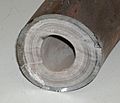Boiler feedwater facts for kids
Boiler feedwater is the special water used to "feed" or supply a boiler. Think of a boiler as a giant kettle that heats water to make steam or hot water. This steam is then used for many things, like making electricity in power plants or heating buildings.
The water that goes into the boiler isn't just any water from the tap. It needs to be super clean and treated in a special way. If the water isn't treated properly, it can cause big problems inside the boiler, like damage and blockages.
Contents
Why Boiler Water Needs Special Treatment
Imagine trying to cook with dirty water; it wouldn't be good! Boilers are similar. They need very clean water to work well and last a long time. Here are the main reasons why boiler feedwater must be treated:
Preventing Scale Buildup
When water is heated, especially if it has minerals like calcium and magnesium (which make water "hard"), these minerals can stick to the inside of the boiler pipes. This sticky layer is called "scale."
What is Scale?
Scale looks a bit like the limescale you might see in a kettle at home. It's a hard, crusty buildup. If too much scale builds up inside a boiler:
- It makes it harder for heat to pass from the fire to the water, meaning the boiler uses more fuel to make steam. This wastes energy and money.
- It can block pipes, reducing how much water or steam can flow through.
- It can cause the boiler to overheat and even get damaged, which is very dangerous.
Stopping Corrosion
Another big problem for boilers is corrosion. You might know this better as rust.
What is Corrosion?
Corrosion happens when metals react with things in the water, like oxygen or certain chemicals. This reaction eats away at the metal, making it weak and leaky.
- If the boiler pipes corrode, they can develop holes, leading to leaks.
- Leaks mean the boiler can't work properly and might need expensive repairs or even replacement.
- Corrosion can also cause small pieces of metal to break off and block other parts of the system.
How Feedwater is Treated
To avoid scale and corrosion, boiler feedwater goes through a special cleaning process called water purification.
Steps in Water Treatment
- Preheating: Often, the water is warmed up before it even enters the boiler. This helps remove some gases and makes the boiler more efficient.
- Filtering: The water is passed through filters to remove tiny particles and dirt.
- Softening: Chemicals or special equipment are used to remove minerals like calcium and magnesium that cause scale. This makes the water "soft."
- Demineralization: For very high-pressure boilers, almost all minerals are removed using a process called ion exchange. This makes the water incredibly pure.
- Chemical Dosing: Small amounts of special chemicals are added to the water. These chemicals help to prevent any remaining scale from forming and protect the metal from corrosion.
After all these steps, the clean, treated feedwater is stored in a tank and then pumped into the boiler, ready to be turned into steam or hot water safely and efficiently.
Images for kids




